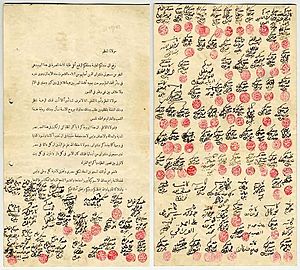Denshawai incident facts for kids
The Denshawai incident was a disagreement that happened in 1906 between British Army officers and people living in the village of Denshawai, Egypt. Many historians believe this event marked a big change in how the British were present in Egypt. Even though the incident itself was small, with only a few people hurt or killed, the way the British officers reacted and the serious results that followed made it very important. Today, the Denshway Museum remembers this event.
Contents
Why Did the Incident Happen?
There were many reasons for the tensions that led to the Denshawai incident. The people of Egypt had felt a strong sense of national pride for a long time. This feeling grew even before the British took control of Egypt in 1882 and before the Urabi revolt. The Urabi Revolt was a movement to free the Egyptian people from their Turkish rulers. This led to the Anglo-Egyptian War.
After the war, the British took charge of the Egyptian government. Evelyn Baring, 1st Earl of Cromer was put in charge. He worked to fix the country's money problems and reduce the debt left by the previous Egyptian rulers, called the Khedives. However, most of the benefits from these changes went to the wealthy upper classes.
The middle class in Egypt was the main group that did not like the British control. They felt the British were not doing enough to stop corruption in the government. British officers started filling many important jobs in the Egyptian government. Newspaper writers argued that skilled and educated Egyptians could have easily done these jobs if the British had not been in charge.
What Happened During the Incident?
On June 13, 1906, a group of British Army officers went hunting for pigeons near Denshawai village. The villagers were upset because they raised these pigeons for food. They were also worried that the hunting could accidentally set their crops on fire. A fight broke out between the officers and the villagers.
During the scuffle, one of the British officers fired his gun. A female villager was hurt and later died from her injuries. This made the villagers even more angry, and they attacked the officers further.
One officer managed to get away and ran back towards the British camp. It was very hot, and he collapsed outside the camp and died, most likely from heatstroke. A villager found him and tried to help. However, when other soldiers from the camp saw the villager next to the dead officer, they wrongly thought the villager had killed him. The soldiers then killed the villager. Later, an Egyptian teenager stabbed the soldiers who had killed the villager.
What Were the Results?
British officials were worried about the growing sense of Egyptian nationalism. They decided to show their power and make an example of the villagers involved. Many villagers were arrested, and four were charged with murder. This decision made Egyptian nationalists even more angry.
Some Egyptian leaders later said that because of this incident and the British reaction, they felt it was impossible to work together with the British Empire. This belief made leaders more concerned about British pressure to change voting rules in Egypt. It also made them push harder for British forces to leave Egypt.
Over time, this incident, along with the rise of Egyptian nationalism, led to a fight against colonial rule in Egypt during World War I. During the war, the Egyptian Expeditionary Force was based in Egypt. Their presence meant that a lot of food and resources were used to fight the Ottoman Empire. This had been a long-term goal for Egyptian nationalists. As the war continued, the anger started by the Denshawai incident grew worse because of rising prices and food shortages. This greatly harmed the Egyptian economy.
By 1919, Egypt was ready for a revolt. While the Allies were trying to make peace after the war, Egyptian leaders, known as the Wafd, were not allowed to go to France to meet with the Versailles peacemakers. Among other things, the Wafd wanted a bigger share in the Anglo-Egyptian Sudan, which was a joint colony of Egypt and Britain. When they were refused entry to Versailles, most of the Egyptian government resigned. This led to huge protests and riots. These riots and the reasons behind them gave Egyptian nationalists a clear goal and more support than they had ever had before the war.
The British decision to punish the villagers was used by Egyptian nationalist groups to stir up public anger against foreign influence in Egypt. Britons who questioned the fairness of the trial were accused of not supporting their country and of helping "troublemakers" in Egypt.
George Bernard Shaw, a famous writer, shared his thoughts on the incident in his play John Bull's Other Island.
How Is the Incident Remembered?
Fifty years later, in 1956, Egyptian journalist Mohamed Hassanein Heikal used the phrase "the pigeons of Denshawai have come home to roost" to describe the results of the Anglo-French attacks in Egypt. He meant that past actions were now having consequences.
"The Hanging of Zahran" is a poem by Salah Abdel Sabour about the incident. Nagui Riad made a film called Friend of Life, which was based on this poem.
There is also a poem by Constantine P. Cavafy called "27 June 1906, 2:00 pm," which begins by describing the hanging of a young boy.
The incident is also mentioned in Ken Follett's 1980 spy novel The Key to Rebecca, which takes place in Egypt.
See also
- Denshway Museum
- Ahmad Fathy Zaghlul
 | Audre Lorde |
 | John Berry Meachum |
 | Ferdinand Lee Barnett |


